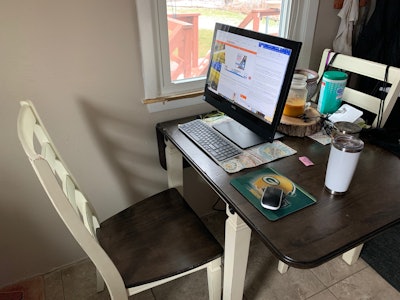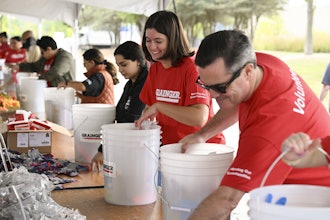
Over the past decade, the term “First-World problem” rose as an Internet meme to mean a trivial or minor problem typically only experienced in First-World nations. Hotel has bad WiFi? That’s a First-World problem. Uber or Lyft running late? First-World Problem. Seated near a crying child on an airplane? First-World problem.
Right now, we’re all experiencing a myriad of First-World problems. The ongoing COVID-19 pandemic has rapidly altered what we know as day-to-day life. Two weeks ago it seemed we were still just monitoring the coronavirus’ spread from afar. Now, much of the United States is essentially under quarantine, which has caused drivers of the economy and America’s social life to slow to a crawl, or a complete halt.
This is truly March Madness, and for the worst reason.
Social distancing, by all measures, appears to be the only way US citizens can collectively slow the spread of the virus to a pace that is manageable by healthcare professionals. This means we can’t socialize at bars and restaurants; thousands of sporting events, concerts and other planned gatherings have been cancelled or  My home work desk for the foreseeable future. Yes, that's a container of disinfectant wipes on the far end.
My home work desk for the foreseeable future. Yes, that's a container of disinfectant wipes on the far end.
Aside from the schools issue, those other life disruptions or more-or-less First-World problems. Individually, neither is that big of a sacrifice to make. The problem is they aren’t individual. There’s a whole bunch of them happening at the same time.
Amid all of this, business still must continue. As if industrial distributors and suppliers didn’t have enough major sources of business stress — tariffs; competition against fellow distributors; the threat of suppliers selling direct; e-commerce/Amazon disruption; and a general major slowdown in demand for industrial products — I have to think there’s plenty of distribution executives out there currently thinking, “when will we ever get a break?”
After the 2008-2009 Great Recession, the industrial supply space had a few great market years until the downturn in oil prices and rig counts in 2014-2015, and then boosted by tax cuts from the Trump administration, 2017-2018 was another stretch of major growth for distributors large and small. But even before COVID-19 began impacting business results in Q1 of this year, the industrial supply market was facing considerable weakened demand over the second half of 2019 and into 2020. The virus causing factories to shut down temporarily worldwide certainly won’t help matters.
Industrial Distribution ran a Twitter poll from March 13 to March 17 asking our followers if their business is mandating or advising at least some employees to work remotely amid the virus outbreak. Though a small sample size at 40 votes, 65 percent said yes. We ran the same poll on our Facebook Group and it had essentially the same voting breakdown. I’m guessing that poll ran again today, the yes percentage would be even higher, given the escalation rate of social distancing measures since March 13.

“I'll begin by addressing the current coronavirus outbreak. We sympathize with those around the world directly impacted by this extreme event. We are focused on doing everything we can to keep our associates and their families safe while providing assistance our customers need during this difficult period.
 DeAngelo
DeAngelo
Our cross-functional response team has implemented and improved various infection controls in our facilities, including increased cleanings of distribution centers and vehicles, additional hand sanitizer stations, and heightened precautions for our drivers and customer facing employees. Our communications outreach and Internet sites keeps our associates updated with news as it happens including future actions that we may need to take to keep our associates safe.
We have business continuity plans in place to minimize any disruptions to day-to-day business which includes allowing many associates to work from home and giving associates who may need to self-quarantine the resources to do so safely and without fear of being penalized. We have restricted nonessential business travel and have asked our associates to take the necessary precautions when they do travel. Managers across the organization are receiving tool kits and we are advising all of our customers to reach out to their designated HD Supply contact for updates.”
One analyst asked what staffing level HD can continue to run its operations efficiently without material hit to margin on inefficiencies, to which DeAngelo answered:
“Our goal is to keep our people as healthy and safe as possible, keep them on the jobsite and in our facilities as long as possible, while also allowing them to take the time off to self-isolate or to get well if they are sick. So it is a balance. Andrew, That is a cost risk that all businesses are going to face as there is going to some additional incremental labor costs associated with illness and with absenteeism.”
Now, HD Supply is a $6 billion distributor and No. 2 on Industrial Distribution’s Big 50 List. But even small distributors can take a few pointers from what HD is doing. I’m certainly no health expert, but here’s what I would advise:
- For any employee who is able to do their job at home, allow them to work from home. Again, it’s not so much about their risk of becoming infected; it’s about who they can spread the virus to.
- Enact social distancing measures for those who need to be in facilities, as best you can. Even the most automated distribution centers require human involvement, but try to minimize instances of close-quarters person-to-person activity.
- Utilize collaborative communication tools and apps such as Slack, Microsoft Teams or even just your email's chat function to enable quick messaging between staff who may be working remotely, instead of cluttering inboxes with emails.
- Provide frequent hand sanitizer stations throughout your office, warehouse and generally everywhere in your facilities. The shorter the distance an employee has to walk to find one, the better the chance they will use them. Encourage employees to use them frequently.
- Restrict company travel as much as possible.
- For distributors that maintain their own trucking fleet, sanitize the cab of trucks after each delivery.
While companies deal with uncertainty abound, we at ID will continue to provide thought leadership from leaders in this industry who can advise distributors on how to navigate business operations.
Check out Insite Software’s recent Q&A with Schilling Supply, a midsize distributor of janitorial, paper, packaging and industrial products about how the virus has impacted the La Crosse, WI-based company’s day-to-day operations and how Schilling is responding to customer needs.
Amid the massive distraction of COVID-19, this isn’t a time for distributors to slow down. As sales guru Paul Reilly explains in a blog post on ID this week, this is time for perspective, not panic. B2B sales staff know that market uncertainty is part of the job. During this chaotic time, salespeople can be a source of positivity and normalcy for customers. Says Reilly to industrial salespeople: “Be the positive beacon of light for your customers, your prospects, and your team during these uncertain times. Use these uncertain times to become the best version of yourself.”
Beyond that, be sure to check out this article from Indian River Consulting Group’s Mike Emerson on how distributors should move forward amid the COVID-19 pandemic. He urges accepting that we won’t have “business as usual” for at least several months — likely longer, and outlines four critical business steps distributors need to take now to strengthen their positions for a new normal.
And earlier this month, Stellar Industrial Supply CEO John Wiborg penned a blog touching on a variety of factors causing market volatility so far in 2020, the latest of which is COVID-19. Overall, Wiborg advised distributors to prepare for uncertainty as the new normal in 2020.
 Mike Hockett, ID Managing Editor
Mike Hockett, ID Managing Editor
So from the ID team, stay safe out there, but forge ahead. And understand that many of the disruptions to daily life are only First-World problems.






















